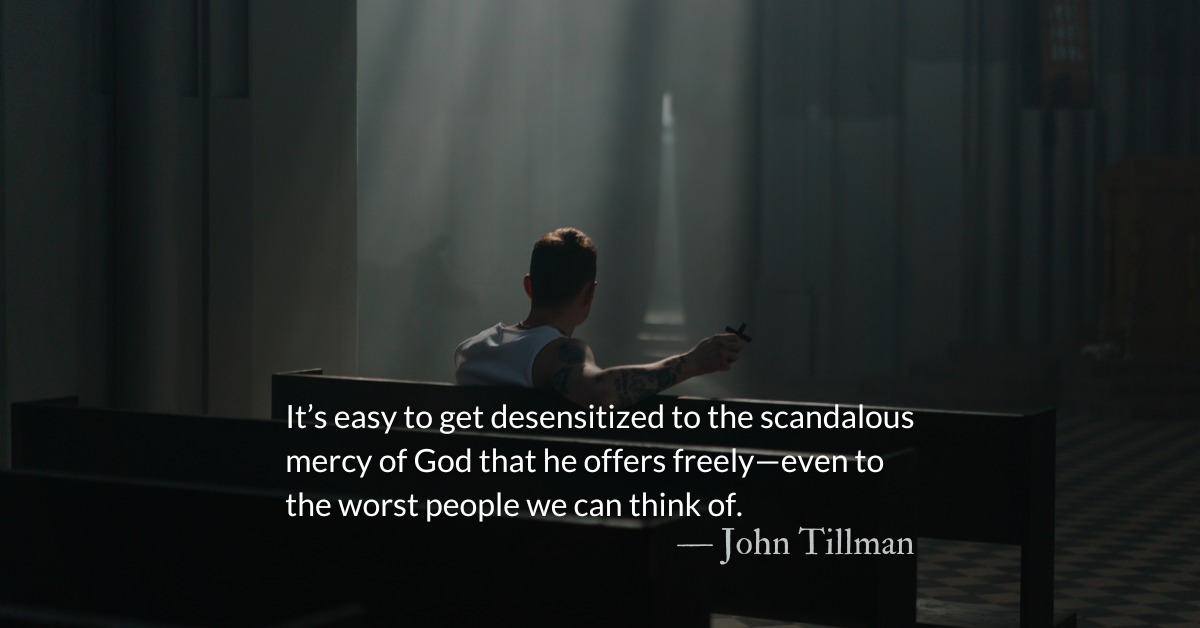Scripture Focus: 2 Kings 5.1-3
1 Now Naaman was commander of the army of the king of Aram. He was a great man in the sight of his master and highly regarded, because through him the Lord had given victory to Aram. He was a valiant soldier, but he had leprosy.
2 Now bands of raiders from Aram had gone out and had taken captive a young girl from Israel, and she served Naaman’s wife. 3 She said to her mistress, “If only my master would see the prophet who is in Samaria! He would cure him of his leprosy.”
Reflection: A Scandalous Mercy
By John Tillman
It’s easy to get desensitized to the scandalous mercy of God that he offers freely—even to the worst people we can think of. Naaman’s story brings all of that home to us.
God used Aram (modern-day Syria) to punish Israel. Naaman, an Aramean general, had led many battles and ordered many raids into Israel, winning victories against Israel’s wicked kings. He had killed many Israelites. He also took a captive Israelite girl as a slave for his wife.
In today’s terms, Naaman would be a warlord, a kidnapper, a human trafficker—a terrorist. He was one of Israel’s great enemies. This enemy, this terrorist, this slaveholder made another trip to Israel. This time, instead of violence, he brought treasures. He wanted to buy a miracle.
Imagine it happening today. Imagine one of Putin’s commanders arriving in Kyiv, asking to be healed. Imagine a Hamas commander arriving in Tel Aviv, expecting a blessing.
Israel’s king can’t handle it. He tears his clothes, thinking that Aram is picking a fight. Gehazi, Elisha’s assistant, can’t handle it. He chases after Naaman to make him pay. Centuries later, Jesus’ hometown crowd in Nazareth can’t handle it. When Jesus references Elisha healing Naaman over native-born Israelite lepers, they try to throw him off a cliff to his death.
The king couldn’t handle it because he suspected it was a trap. Not only did he believe it was impossible to heal Naaman’s leprosy, but he also believed a man like Naaman couldn’t make a sincere request. It had to be a scam, and he refused to fall for it.
Gehazi couldn’t handle it because he believed Naaman deserved to pay for what he had done. He couldn’t accept the injustice of offering mercy to a killer, even after his conversion to worship God alone. He wanted Naaman to pay and set out to collect that payment.
Nazareth couldn’t handle it because it short-circuited their selfishness. They loved the idea of “setting captives free,” so long as they were the captives and their oppressors were thrown down. But when Jesus implied that even oppressors could be saved, they tried to murder the former hometown hero.
The enslaved Israelite girl initiated the healing of her oppressor and enemy. Could you do so? Could I?
God has mercy on whom he has mercy. Can we handle God’s mercy? Can we proclaim it to our enemies? Can we celebrate it?
From John: On the weekend the Israel-Hamas war broke out a member of our church who is from Israel led prayer. He prayed for peace, healing, and protection not only for Israel, but for people in Gaza. This is how we continue to pray. For cautious restraint of military leaders so that innocent lives would be spared. For peace and freedom for Israel and Gaza and all Palestinians. We pray that those with a righteous cause would pursue a righteous course, for the path of rage and vengeance never leads to peace.
Divine Hours Prayer: The Morning Psalm
He has not dealt with us according ot our sins, nor rewarded us according to our wickedness.
For as the heavens are high above the earth, so is his mercy great upon those who fear him.
As far as the east is from the west, so far has he removed our sins from us.
As a father cares for his children, so does the Lord care for those who fear him.
For he himself knows whereof we are made; he remembers that we are but dust. — Psalm 103.10-12
– From The Divine Hours: Prayers for Summertime by Phyllis Tickle.
Today’s Readings
2 Kings 5 (Listen 5:13)
Psalms 50 (Listen 2:26)
Read more about When God Has Mercy…Will We?
Jonah seemed to believe mercy should be limited to his own tribe and country while everyone else burned. How many of us are like him?
Read more about Radical Outreach to Outcasts
Jesus will say something that makes us want to throw him off a cliff in anger. He will ask us to allow someone in we would prefer to keep out.











